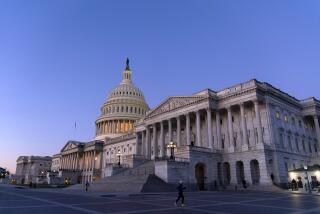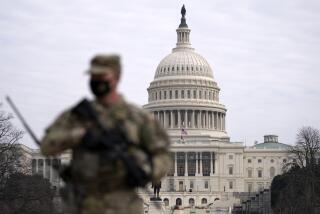House Committee Balks at Bush’s Security Plan
WASHINGTON — Spurning the White House blueprint for homeland security, a key House committee voted Thursday to block the transfer of the Coast Guard and the Federal Emergency Management Agency to the huge new government department envisioned by President Bush.
The action by the House Transportation and Infrastructure Committee portends a bruising floor battle between those lawmakers who seek to defend the president’s plan and others who argue that some federal agencies work well just as they are and should be left alone. The fight is expected to roil party lines, with Republicans and Democrats on each side.
Also at issue, inevitably, is turf.
Rep. Don Young (R-Alaska), chairman of the transportation committee, is fighting to keep the Coast Guard’s 43,600 employees under the Transportation Department, which his panel oversees. FEMA, now an independent agency with 5,100 employees, is another part of the committee’s empire that Bush wants to draw into the proposed Department of Homeland Security.
Young, usually a strong Bush ally, made plain Thursday the president won’t win without a fight. The Coast Guard, he said, does far more than patrol seaports, and FEMA does far more than respond to catastrophes like the Sept. 11 terrorist attacks.
Roping the two agencies into homeland security, Young said, could compromise Coast Guard missions, such as search and rescue, illegal drug interdiction and protection of fisheries, and FEMA tasks related to floods, earthquakes and other natural disasters.
“I have expressed these concerns to the president and to the [congressional] leadership,” Young said, complaining about the rush in Congress to produce a homeland security bill. “Legislation of this significance deserves a more considered approach.”
Working with committee Democrats, Young won approval for his version of the homeland security bill on a voice vote. The nonbinding recommendation from the 75-member committee, along with versions from other panels, now heads to a group of House leaders. They are scheduled to hammer out a bill next week before the issue moves to the floor.
As the transportation committee challenged the president, the House leaders heard strong defense of the Bush plan from senior Cabinet officials, including Secretary of State Colin L. Powell and Atty. Gen. John Ashcroft.
Powell, addressing questions raised about the State Department’s visa program, acknowledged that diplomats in consular offices around the world have sometimes erred in choosing which foreigners should be allowed to visit the United States. But he told a panel headed by House Majority Leader Dick Armey (R-Texas) that State remains the best qualified department for the job.
“Have our efforts been defeated from time to time? From time to time, do we have someone who does not live up to their responsibilities? Yes, that has occurred,” Powell said. “But when we find it, we go after it.”
Despite criticism of the State Department in some quarters, many lawmakers appeared to agree with Powell. Several committees have ratified Bush’s plan for homeland security to oversee visa programs but for the State Department to run them.
At the same hearing, House Minority Whip Nancy Pelosi (D-San Francisco) criticized another portion of the Bush plan that she said could erode civil service protections for federal employees in the Homeland Security Department and weaken open-government laws, such as the Freedom of Information Act. “The good-governance issues are ones that we must take very seriously,” Pelosi said.
Treasury Secretary Paul H. O’Neill, however, pleaded with the lawmakers to “give the new secretary a substantial grant of authority for flexibility.”
On the open-government issue, Deputy Secretary of Defense Paul D. Wolfowitz said, “You won’t get a lot of information that is extremely important in catching terrorists if everything is deemed to be at risk of public exposure.”
Ashcroft spoke against a recommendation made Wednesday by the House Judiciary Committee to split the Immigration and Naturalization Service into one enforcement unit, under homeland security, and a service unit, under the Justice Department. Frequently, he said, the roles of border enforcement and immigration services overlap. “To have them in different departments might make very difficult the kind of coordination that’s necessary,” he said.
Ashcroft’s comments signaled that the matter could lead to more debate on the House floor.
Also Thursday, several other House committees--Government Reform, Agriculture, and Energy and Commerce--considered their proposed changes to the bill.
The agriculture panel, for instance, approved a version that would alter Bush’s proposal to draw an 8,600-employee unit of the Agriculture Department into homeland security.
Under the committee plan, which lawmakers said the Bush administration would probably support, employees of the Animal and Plant Health Inspection Service who work at ports of entry to the United States would be folded into homeland security, but others who deal with eradication of crop diseases and pests would not.
More to Read
Get the L.A. Times Politics newsletter
Deeply reported insights into legislation, politics and policy from Sacramento, Washington and beyond. In your inbox three times per week.
You may occasionally receive promotional content from the Los Angeles Times.










